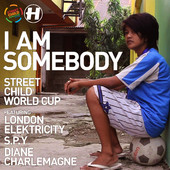- Dettagli
- Categoria: Women views on news
- Pubblicato: 03 Marzo 2014
 Major attempt to raise money for street children – and get into the Guinness Book of Records.
Major attempt to raise money for street children – and get into the Guinness Book of Records.
In March, ahead of the FIFA World Cup, the second-ever Street Child World Cup (SCWC) – like the World Cup proper – will take place in Rio de Janeiro.
SCWC will unite teams of street children from up to 20 countries, drawn from a network of outstanding projects campaigning for the rights of street children.
And this year the Street Child World Cup kicks off a girls-only competition.
Ten teams of street-connected girls, aged 14 – 17, will both play football and take part in an international conference highlighting the issues girls face living and working on the streets.
England will be represented by a girls’ team made up of nine young people aged 14-17 who have experienced homelessness in London.
About 67,000 children in England are looked after away from their family home, and just under half of these – 44 per cent – are girls.
Team England have been training every week with coaches from Arsenal in the Community and Chelsea Ladies’ and England player, Claire Rafferty.
Rafferty is also a business analyst for Deutsche Bank – Team England sponsors.
‘Representing your country is one thing; doing it so that others can get a better life is priceless. I am amazed by the passion and energy the girls are giving to this tournament and am delighted to be part of it,’ she said.
The girls are sponsored by Deutsche Bank’s youth engagement programme, Born to Be, and StreetSmart, an organisation which raises money via leading restaurants and hotels for hundreds of projects tackling homelessness throughout the UK.
The girls’ tournament is an important statement of solidarity with street girls who are so often both unseen and denied the opportunities to play sport. It provides these girls with an opportunity to change people’s perception and challenge stereotypes and for their stories to be heard.
The girls’ tournament is not to be seen as separate from the Street Child World Cup as a whole; it is crucial to engage boys with the issues girls on the streets face, since they are often (but of course not always) the perpetrators of such abuse. The idea is that engaging both girls and boys together means supportive and respectful behaviours can be taught.
SCWC has support from women’s national and league teams; Brazil’s women’s team are being role models and ambassadors for the girls, and will run workshops and mentor them during their time in Rio.
The first Street Child World Cup was in South Africa 2010, just before of the FIFA World Cup.
An organisation called Umthombo had been campaigning for a decade to end the illegal ‘rounding-up’ of street children. That had intensified ahead of the tournament.
The idea was for a World Cup which included rather than excluded street children. It was a great success and the ‘Durban Declaration’, which was produced by and for the children, was presented to the UN Committee on Human Rights and to the governments of the teams which took part.
The issues for girls:
Girls are more often abused, denied opportunities and basic rights. It is a sad reality that many girls are on the street due the simple fact that they are a girl – some come to the street for example because they are escaping a life of domestic servitude, expected due to their gender. The kinds of situations girls have left behind when they arrived on the streets often make reintegration with girls far more complex.
Typically, there are fewer girls than boys on the streets – in many places they stay hidden either to protect themselves or because once they come to the streets they are forced to get involved in less visible activities such as prostitution.
Gender stereotypes are being lived out because girls are not properly supported or represented – they are neglected, marginalized and vulnerable to gender-based violence and abuse, both on the streets and in the situations leading up to their arrival there.
There are not enough specific services for street connected girls, and many projects find it difficult to engage them.
But SCWC does not want to just focus on the hardships and injustices girls face on the street; the Street Child World Cup girls tournament is an opportunity to talk about the positives – to show the world their potential and hopes for the future.
You can join the girls on the Road to Rio by following and sharing their stories here.
And on 3 March over 1,500 children, aged 7 to 16, from 27 London schools will take over London’s Royal Albert Hallto bang the drum for street children’s rights and attempt to smash the official World Record for the World’s Largest Samba Band – currently standing at 1,038.
This performance also marks the UK launch of the second Street Child World Cup.
Support the youngsters and street children’s rights and text SCWC14 and the amount to 70070 to donate to Street Child World Cup and help make a difference.
The Albert Hall event will feature an exclusive performance of the official SCWC anthem “I Am Somebody” by Hospital Records artists London Elektricity, S.P.Y and Diane Charlemagne. It is available from iTunes here.
Hospital Records – one of the biggest labels in UK dance music – are donating all proceeds to Street Child World Cup.
So you can buy the song, share this video with your friends, your family and your colleagues – and support street children.
Magic.
Thanks.
Leggi tutto... http://feedproxy.google.com/~r/WomensViewsOnNews/~3/_aItsphQJkk/








